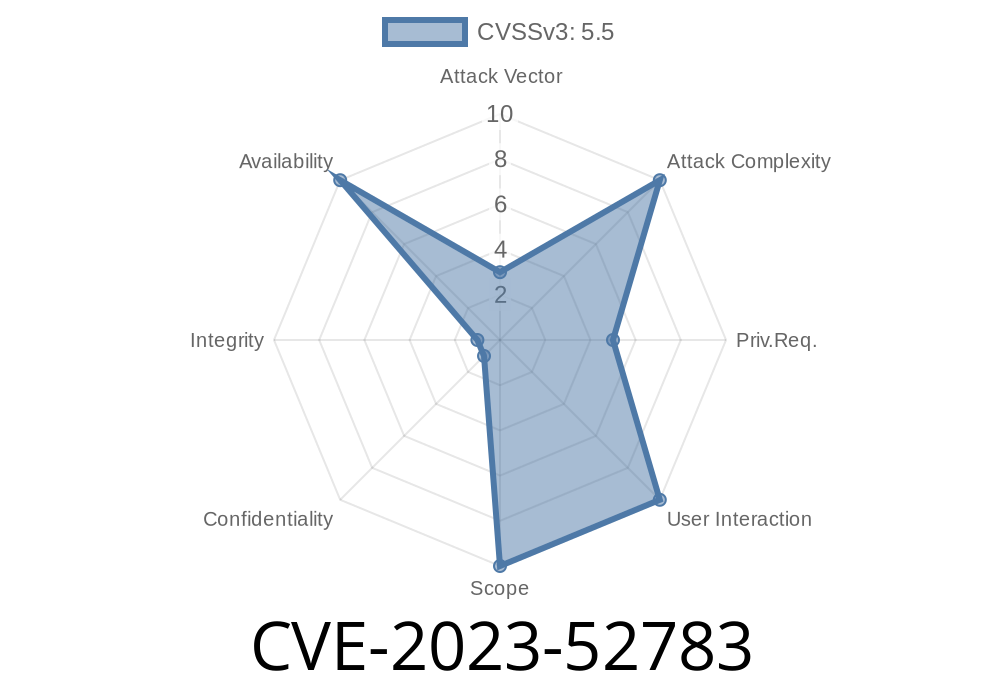In late 2023, security researchers discovered a significant vulnerability in the Linux kernel's networking subsystem, specifically in the wangxun network driver. This vulnerability, now known as CVE-2023-52783, could lead to a kernel crash (kernel panic) by exploiting a missing memory allocation check. If you’re running servers or systems using wangxun network devices, understanding and patching this is crucial for system stability.
This article breaks down the issue in simple terms, offers code snippets to illustrate the bug, and provides references and details on the exploit.
What is CVE-2023-52783?
CVE-2023-52783 is a null pointer dereference bug in the Linux kernel's wangxun network driver. If a device uses a custom subsystem vendor ID, a certain function (wx_sw_init()) exits too early—before it properly allocates memory for the mac_table. This lets later code access a null pointer, crashing the kernel.
- Affected component: drivers/net/ethernet/wangxun
The root cause lies in this function
static int wx_sw_init(struct wx *wx)
{
if ((pdev->subsystem_vendor != PCI_SUBSYSTEM_VENDOR_ID_WANGXUN) ||
(pdev->subsystem_device != PCI_SUBSYSTEM_ID_WANGXUN)) {
/* Early return, skips mac_table allocation below */
return ;
}
wx->mac_table = kcalloc(table_size, sizeof(*wx->mac_table), GFP_KERNEL);
if (!wx->mac_table)
return -ENOMEM;
// ... Initialization code
}
What goes wrong?
If the device has a non-standard (custom) subsystem_vendor or subsystem_device ID, the function exits at the early return ; and never allocates memory for wx->mac_table. Later, when the code tries to access wx->mac_table, it finds a null pointer and the kernel panics.
Exploit Scenario
While this isn't a remote code execution bug, it can be triggered locally with crafted hardware or, in virtual environments, with custom PCI device IDs.
Proof-of-Concept (Simplified)
struct wx my_wx = { .pdev = { .subsystem_vendor = x9999, .subsystem_device = x9999 } };
wx_sw_init(&my_wx);
// Later in code:
if (!my_wx.mac_table) // This will be NULL
do_something(my_wx.mac_table); // Kernel crash here!
Patch and Resolution
The fix is straightforward: always allocate memory for the mac_table, or ensure no later code touches it if it's not allocated.
Upstream Fix Example:
Patch link (kernel.org)
Fixed code sample
static int wx_sw_init(struct wx *wx)
{
wx->mac_table = kcalloc(table_size, sizeof(*wx->mac_table), GFP_KERNEL);
if (!wx->mac_table)
return -ENOMEM;
// ...rest of the code, even if custom IDs
}
How to Protect Your Linux System
1. Update your kernel: Make sure you’re running a Linux kernel with this patch. Most major distributions (Ubuntu, Red Hat, Debian) released security updates.
2. Check driver usage: If you aren't using wangxun ethernet cards or drivers, you aren’t affected.
3. Be careful with custom PCI devices: Custom or virtual devices might still tickle the bug if using older kernels.
4. Audit dmesg/logs: Look for unexplained kernel panics involving network drivers.
References
- CVE-2023-52783 entry at cve.org
- Upstream commit fixing the bug
- Security mailing list discussion
Conclusion
CVE-2023-52783 is a great lesson in why careful pointer handling—and full initialization paths—are so important in kernel code. Even a small slip in handling special device IDs led to a major system crash risk. If you run Linux systems with wangxun drivers, update your kernel or apply the patch as soon as possible.
Timeline
Published on: 05/21/2024 16:15:17 UTC
Last modified on: 08/02/2024 23:11:35 UTC
